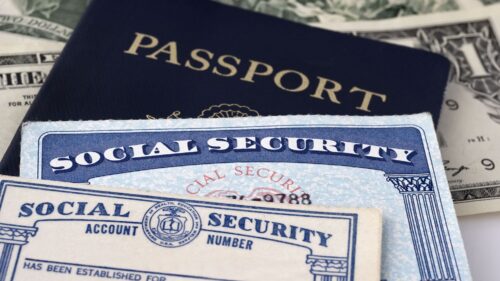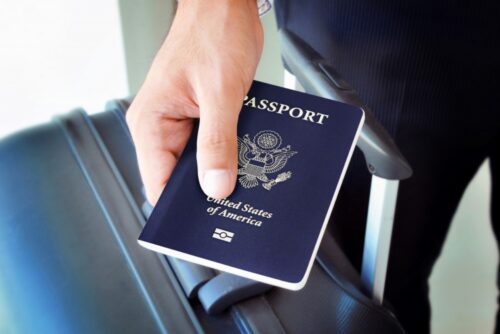U.S. Visa Alert: Passport Requirements

There are no major updates to the Western Hemisphere Travel Initiative (WHTI) requirements as of October 26, 2023.
U.S. Department of Homeland Security (DHS) and U.S. Department of State (DOS) Announce Passport Requirement for Air Travel to U.S. Effective January 23, 2007.
DHS and DOS announced that, beginning January 23, 2007, citizens of the U.S., Canada, Mexico and Bermuda traveling by air will be required to present a passport to enter the U.S. The only acceptable alternative documents to a passport for air travel will be the Merchant Mariner Document (MMD) and the NEXUS Air card. The MMD or “z-card” is issued by the U.S. Coast Guard to U.S. merchant mariners and may only be accepted when used on official business by U.S. Citizen Merchant Mariners. Members of the U.S. military, when traveling on official orders, may continue to present their military ID and orders for entry. The NEXUS Air card is issued to citizens of Canada and the U.S., lawful permanent residents of the U.S. and permanent residents of Canada who meet certain eligibility requirements and may only be accepted when used in conjunction with the NEXUS Air program.
A separate proposed rule addressing land and sea travel will be published at a later date proposing specific requirements for travelers entering the U.S. through land and sea border crossings. As early as January 1, 2008, U.S. citizens traveling between the U.S. and Canada, Mexico, Central and South America, the Caribbean, and Bermuda by land or sea will be required to present a valid U.S. passport or other documents as determined by DHS.
The Basics – What Is It, Whom Does It Affect And When Does It Go Into Effect
The Air portion of The Western Hemisphere Travel Initiative (WHTI) will require, with some exceptions, citizens of the United States, Canada, Mexico, and the British Overseas Territory of Bermuda to present a passport to enter (or re-enter) the United States when arriving by air from any part of the Western Hemisphere beginning January 23, 2007.
Who Will the Travel Initiative Affect?

U.S. citizens will need a passport to enter the United States by air from Canada, Mexico, Bermuda, South and Central America, and the Caribbean (otherwise known as the Western Hemisphere).
Also under this rule, citizens of Mexico, Canada, and Bermuda will now have to have a passport when entering the United States by air.
While United States citizens are currently required to have passports to enter most countries in Central and South America, this rule makes clear that the passport must be presented upon return to the United States as well.
When Will the Travel Initiative Be Implemented?
The initiative will be implemented in two phases. The timeline is as follows:
Phase 1: Beginning January 23, 2007, U.S. citizens and citizens of Canada, Mexico and Bermuda traveling by air between the U.S. and Canada, Mexico, Central and South America, the Caribbean, and Bermuda will be required to present a valid passport to enter (or re-enter) the U.S.
Phase 2: On June 1, 2009, WHTI was expanded to include land and sea travel. U.S. citizens traveling between the U.S. and Canada, Mexico, the Caribbean, and Bermuda by land or sea (including ferries) must now present a valid U.S. passport or other documents as determined by the Department of Homeland Security.
How Do I Get A Passport?
United States citizens can visit the State Department’s travel Web site travel.state.gov, or call the U.S. National Passport Information Center: (877) 4USA-PPT; TDD/TTY: (888) 874-7793. Additionally, instructions for obtaining a passport are available through the U.S. Postal Service: https://www.usps.com/passport/.
The average processing time for a passport is 6- 8 weeks. Expedited passport services are available for emergent or unexpected travel. Please visit https://travel.state.gov/content/travel.html for additional information. Peak domestic passport processing is between January and July. For faster service, we recommend applying between August and December. U.S. citizens living outside the U.S. should contact the nearest U.S. embassy or consulate. Foreign nationals should contact their respective governments to obtain passports.
How Many U.S. Citizens Currently Hold Passports?
If you have purchased the TN Visa Kit, Mr. Sapochnick will offer you a free consultation to discuss your H1B options as well as a discounted price on your application. Please reference your TN Visa Kit receipt number to receive this offer.
According to the U.S. State Department, as of October 2023, there are 160,668,889 valid U.S. passports. This represents approximately 56% of the U.S. adult population.
How Many Canadian Citizens Travel With Passports?
According to the Passport Program of the Government of Canada, 70% of Canadians had passports in 2022. This is an increase from 60% in 2016. The increase can be attributed to a number of factors, including the rise of international travel, the growing popularity of passport cards, and the government’s efforts to make it easier for Canadians to obtain passports.
In 2023, the percentage of Canadians traveling with passports is likely to be even higher, as more and more people are choosing to travel internationally. According to the World Tourism Organization, international tourist arrivals are expected to reach 1.8 billion by 2030.
How Will U.S. Lawful Permanent Residents (LPRs) Be Affected by the Passport Requirement?
LPRs will continue to be able to use their Alien Registration Card (Form I-551) issued by DHS, or other valid evidence of permanent residence status is needed for entry to the United States.
What If I Am an LPR, But My Children Are U.S. Citizens?
Children who are U.S. Citizens will need to obtain a passport even if their parents are Green Card holders.
What Do I Need to Travel to Canada or Mexico?
Different countries may have different travel document requirements. It is best to check with the country you are visiting to determine the appropriate travel document requirements (for instance, whether you need a passport and/or visa). You can find out more by referring to the State Department website at https://travel.state.gov.
I Am a Mexican Citizen and Have a Valid Border Crossing Card (BCC). Will I Be Required to Also Present a Passport to Travel to the United States by Air?
Yes. Under this final rule, Mexican citizens, just like U.S., Canadian and Bermudan citizens, will be required to present a passport for air travel. The BCC, while currently serving in lieu of a passport and visa for land border crossings within the border region, may also be used as a visitor’s visa. However, due to the unique circumstances of air travel, additional presentation of a passport is necessary.
What Happens to Persons Who Attempt to Enter or Re-enter the Country Without a Passport or an Alternative Travel Document?
For the general public, people who apply for entry but do not have appropriate documentation will likely be referred for secondary screening at the port. In secondary, Customs and Border Protection (CBP) officers will evaluate any evidence of citizenship or identity the individual may have and will verify all information against available databases. For foreign nationals, a determination will be made at that time whether to admit the individual or not. However, to prevent delay at the ports of entry, we encourage all travelers to obtain the appropriate documents before traveling.
In addition, the State Department has processes to assist U.S. citizens overseas to obtain emergency travel documentation for those with lost or stolen passports.
Originally, the Proposed Date of Implementation for the Air and Sea Phase was January 1, 2007. Why the Change? Why Was the Sea Requirement Postponed?
After examining the possible impact on national security from the delay, the Departments of Homeland Security and State proposed an early 2007 implementation in response to comments from the airline industry to facilitate holiday travel. Based on the recently issued Department of State proposal to allow the use of the Passport Card in the sea environment, Congress’ intent with respect to the land and sea environments as expressed in the 2007 Homeland Security Appropriations Bill, and the public comments we received, we have decided to defer decisions on the proposed changes to documentation requirements for arrivals by sea.
Other Than a Passport, What Types of Documents Will Be Acceptable Under this Initiative for Air Travel?
Individuals traveling by air within the Western Hemisphere will be required to present a passport for admission to the U.S. with limited exceptions.
This Final Rule outlines two additional documents that will be acceptable for air travel. The first is the Merchant Mariner Document (MMD) or “z card” issued by the U.S. Coast Guard that will be acceptable for use under WHTI by U.S. citizen merchant mariners traveling on official business. The other document is the NEXUS Air card, for which enrollment is limited to citizens of Canada and the United States, lawful permanent residents of the United States and permanent residents of Canada. Details on enrollment of this program can be found at: https://www.cbp.gov/xp/cgov/travel/
Can the NEXUS Air Card Be Used at Any Air Location?
NEXUS Air cards will only be accepted in conjunction with the NEXUS program at designated NEXUS sites. For more information please refer to: https://www.cbp.gov/xp/cgov/travel
How Will Members of the U.S. Armed Forces Be Affected by the Passport Requirement?
There are no changes proposed for members of the U.S. armed forces traveling on active duty.
Currently, an individual traveling as a member of the United States armed forces on active duty is not required to present a valid passport to enter or depart the United States. There are no changes under the air rule for members of the U.S. armed forces. Any future changes, if necessary, will be addressed during the second phase of the WHTI rulemaking process.
This does not apply to spouses and dependents of these military members. Spouses and dependents will be required to present a passport (and valid visa, if applicable) when traveling into the United States under WHTI.
Will Travelers From U.S. Territories Need to Present a Passport to Enter the United States?
No. These territories are a part of the United States. U.S. citizens returning directly from a U.S. territory are not considered to have left the U.S. territory and do not need to present a passport. U.S. territories include the following: Guam, Puerto Rico, the U.S. Virgin Islands, American Samoa, Swains Island and the Commonwealth of the Northern Mariana Islands.
Do the Documentation Requirements Apply to Children?
Yes, children will be required to present their own passport when entering the United States at airports.
Additional Background – Legislative History and the Implementation Process
Why is the U.S. Government Implementing the Travel Initiative?

The Intelligence Reform and Terrorism Prevention Act of 2004 (IRTPA) mandated that the U.S. secretaries of Homeland Security and State develop and implement a plan to require U.S. citizens and foreign nationals to present a passport or other appropriate identity and citizenship documentation when entering the United States.
For many years, U.S. citizens, and some citizens of other countries in the Western Hemisphere including Canadians and Mexicans with Border Crossing Cards (BCCs or “Laser Visas”), have not been required to present a passport to enter the United States. Currently, a traveler may make a verbal declaration of citizenship, or present other forms of documents to enter the country that cannot currently be validated or verified in a timely manner, such as birth certificates and driver’s licenses.
This change in travel document requirements is also the result of recommendations made by the 9/11 Commission, which Congress subsequently passed into law in the Intelligence Reform and Terrorism Prevention Act of 2004.
In light of the new security efforts, the United States proposal requires all travelers to present a passport or other accepted document for entry into the United States by air to determine the eligibility for entry of legitimate travelers without disrupting their movement.
Did the general public provide input into the planning and implementation of the travel initiative?
The general public has had the opportunity to comment on plans to implement the WHTI during the Advance Notice of Proposed Rulemaking and the Notice of Proposed Rulemaking. Those comments were considered in preparing the Final Rule.
There Have Been Concerns Within the Travel and Tourism Industry About the Effects That the Passport Requirement Will Have on the Economy. How is This Being Addressed?
DHS has prepared a separate economic analysis, known as the Regulatory Impact Assessment, which was summarized in the Notice of Proposed Rulemaking issued in August 2006. DHS has determined that the benefits – facilitation of travel and increased security in the air and sea environments justify the potential costs.
We have been, and will continue to, work very closely with the travel and tourism industries, as well as border communities and local elected officials, to address their concerns as we move forward in this process. Maintaining open channels of communication are critical in this endeavor and we welcome responses and suggestions made by these groups.
A complete and detailed “Regulatory Impact Assessment” can be found in the docket for this rulemaking: www.regulations.gov; see also www.cbp.gov.
How Will This Requirement Affect Land Border Crossings?
DHS and the State Department understand that the greatest potential change will occur at the land borders. IRTPA specifically mandated that the concerns of border communities be considered. We recognize the implications this might have for industry, business and the general public, as well as our neighboring countries, and they are important partners in this initiative. Future proposed rule making will allow these affected publics to submit comments to the proposals for land border implementation of the WHTI.
Currently, more than 800,000 individuals enter the United States through the United States’ various land border crossings every day.
Which Documents Will Be Required for Land Border Crossings Under WHTI?
The U.S. passport is valid for entering the United States by land, sea or air.
DHS is exploring whether other documents could also serve as acceptable substitutes for the passport at land ports of entry and expects to address this topic in the proposed rulemaking. We anticipate that the proposed Passport card, BCC, SENTRI, NEXUS and FAST cards would be acceptable under the Travel Initiative.
Additional information on the land and sea implementation of this requirement will be available once a Notice of Proposed Rulemaking is published in the Federal Register. Additional information pertaining to the proposed next steps will be made available publicly at that time.

